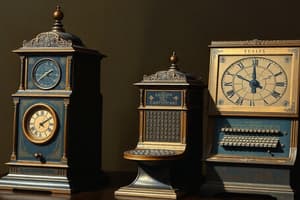Podcast
Questions and Answers
Who produced the binary algebra?
Who produced the binary algebra?
- Martin Wiberg
- George Boole (correct)
- William Stanley
- Alan Turing
Which device was created by William Stanley?
Which device was created by William Stanley?
- Reworked difference engine
- Hollerith machine
- Calculating device
- Practical logic machine (correct)
What invention is associated with Atansoff?
What invention is associated with Atansoff?
- AND logic gate
- Difference engine
- Flip flop circuit design
- ABC machine for solving linear equations (correct)
Who was responsible for the AND logic gate?
Who was responsible for the AND logic gate?
Which invention is attributed to Hopper-Howard?
Which invention is attributed to Hopper-Howard?
What is the maximum number of digits the pascaline can handle for addition?
What is the maximum number of digits the pascaline can handle for addition?
Which of the following operations can the calculation clock perform?
Which of the following operations can the calculation clock perform?
How does the digital capacity of the pascaline compare to that of the calculation clock?
How does the digital capacity of the pascaline compare to that of the calculation clock?
Which of the following calculators is capable of performing multiplication?
Which of the following calculators is capable of performing multiplication?
What is the primary function of both the calculation clock and the pascaline?
What is the primary function of both the calculation clock and the pascaline?
Flashcards are hidden until you start studying
Study Notes
Early Computing Devices
- Difference Engine/Analytical Engine: Designed by Charles Babbage, a British mathematician, to calculate mathematical tables and logarithms.
- Binary Algebra: Developed by George Boole, it forms the foundation for modern computers.
- Practical Logic Machine: Created by William Stanley.
- Reworked Difference Engine: Built by Martin Wiberg.
- AND Logic Gate: Invented by Walther Bothe, a fundamental component in digital circuits.
- Turning: Alan Turing, considered the "father of computer science," contributed significantly to the development of computing.
- Calculating Device: Konrad Zuse built a calculator for mathematical problems and the first programming language.
- Flip-Flop Circuit Design: Developed by Eccles-Jordan, essential for storing data in computer memory.
- ABC: Atanasoff designed a machine able to solve systems of linear equations.
- Mark 1: Constructed by Howard Aiken, a Harvard University professor. It was a first generation computer that utilized electrical switches and punched tape for instructions.
- Hollerith Machine: Invented by Herman Hollerith, this machine was used for data processing using punched cards and helped define the birth of data processing.
Apple Computers
- GS/OS: Operating system developed by Apple responsible for file system management, input/output control.
- Apple I: Featured an Intel 4004 microprocessor.
- Apple II: Utilized a Motorola microprocessor.
Fifth Generation of Computing
- Artificial Intelligence is the goal of the fifth generation of computing: It aims to create computers with human-like intelligence.
- The quest for artificial intelligence has been challenging: Progress towards creating genuinely intelligent machines has been slow.
ARPANET
- A precursor to the internet, ARPANET (Advanced Research Projects Agency Network) was developed for research and communication by the US Department of Defense.
IPTO (Information Processing Techniques Office)
- A branch of the US Department of Defense (DoD) that supported the initial development of ARPANET.
TCP/IP
- The protocols that underpin the internet, TCP (Transmission Control Protocol) and IP (Internet Protocol) enable communication between devices and applications.
Protocols
- A set of rules that define how data is transmitted and received over a network.
FLAG (Functionally Labelled Array Group)
- A type of data organization and transmission within networks.
NSFNET
- Funded by The National Science Foundation (NSF), NSFNET was a network that connected universities and research institutions. It played a major role in the development of the internet.
Internet Relay Chat (IRC)
- A communication protocol that enabled real-time chat over the internet.
Organizational Skills
- Skills essential for managing, structuring, and optimizing information and work tasks.
E-commerce
- Describes the use of internet technology solely for selling products or services to end customers.
E-business
- A broader concept involving the integration of internet technology into business processes including operations, management, customer relations, and supply chain activities.
Studying That Suits You
Use AI to generate personalized quizzes and flashcards to suit your learning preferences.



